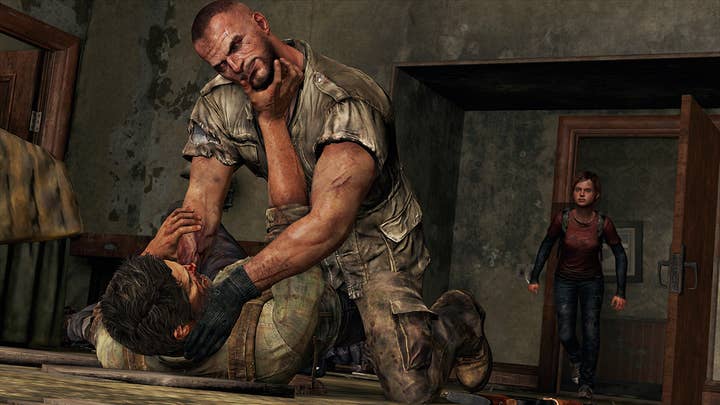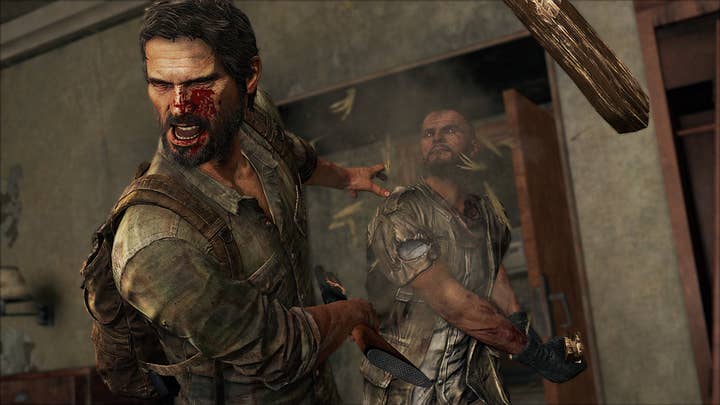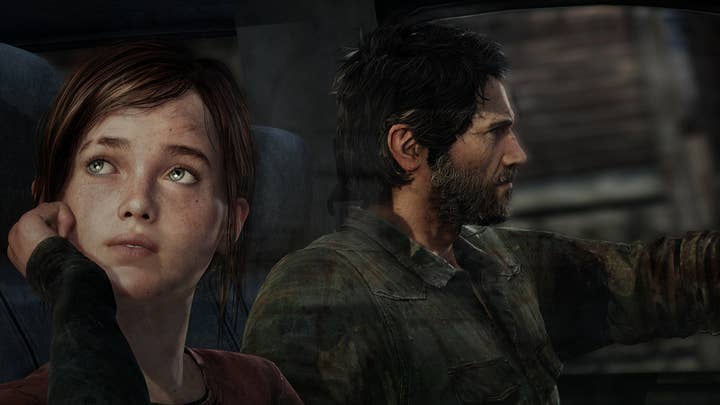The Last of Us: Naughty Dog On Elevating the Interactive Medium
Bruce Straley talks about marrying gameplay and storytelling
As we enter the last year or two of the current console cycle, publishers are less and less inclined to announce or launch any new IP. At E3 last month, however, Sony shined a spotlight on two great-looking new properties: Beyond from David Cage and The Last of Us from Naughty Dog. The Last of Us got a rousing ovation for its demo during Sony's press conference, and game director Bruce Straley explained to GamesIndustry International his aspirations for Naughty Dog's newest project.
For Straley and Naughty Dog, it's all about raising the bar for storytelling in games. While Uncharted and other games have demonstrated strong narrative through cut-scenes, that's not necessarily what it's all about in The Last of Us. Straley explained that his goal is to truly marry gameplay to the emotions and motivations of the two protagonists trying to survive, Joel and Ellie.
"We just feel that if you're going to do a story, then you should learn how to make the story. It's as simple as that"
Bruce Straley
"We're working in an interactive medium of video games. We own that. We own the fact that we are making a video game. Part of making a video game is telling a story, so for us it's interesting to find out how to best marry good storytelling with good gameplay," he said.
"The medium has a lot of opportunities to do games different ways, stories different ways, etc. And you can see a variety... We just feel that if you're going to do a story, then you should learn how to make the story. It's as simple as that. If you're going to write a book, you should probably take a class on writing. If you're going to do screenwriting, then learn the craft of screenwriting. If you're going to do pottery, you're not just going to start - so anything that you're going to do, you have to perfect it. And I think that's all we're ever trying to say is that we are trying to do the best video game - interactive medium, storytelling, interaction, etc - that we possibly can," he continued.
Ultimately, players of Naughty Dog's games should feel a deep connection to the characters, whether Nathan Drake, or in this case, Joel and Ellie.

"It's just consciousness of how to marry gameplay with the motivations of these characters. If we're doing our job right, you as the player feel aligned with the motivations of these characters. The feeling that you get when you're playing through these environments is the same feelings that these characters are feeling. That takes a lot of consciousness and a lot of effort to try to figure out how to use the interactive medium and the storytelling and weave them together," he said.
Straley pointed out that part of making the player feel aligned with the characters' feelings is to really immerse that player in the violence and brutality of each action that Joel and Ellie take. It's one of the ways in which the gameplay and storytelling truly merge.
"We've invested a lot of time in our AI and making sure that these humans that you're facing in this world that we've created are realistic in that, there's a brutality, there's a violence, but it's not gratuitous"
Bruce Straley
"We're trying to emphasize the reality of the situation that Joel and Ellie are in. There are consequences to your actions," Straley explained. "If you go in willy nilly and just expect to come out unscathed, then you're wrong. We want to make sure that there are a lot of opportunities for action and a lot of opportunities to get your rocks off inside of this world, but at the same time, that has to do with how much you've invested in exploring the world. How much ammo did you come into this scenario with? Have you been able to craft something like a molotov? Do you have two molotovs? Do you have a health kit? What do you have? And you're using the same inventory items for both crafting the molotov as well as the health kit, so you're making a choice: Am I going to be offensive or defensive?"
"Our inventory system is living, meaning the game is still running. You're not paused when you're going into your inventory. So it's just like you've pulled the backpack off of your back and you're in there creating something live while the enemies are moving around the environment and coming to get you if you've engaged with them. So what we want to try to do is make you feel that there is a consequence to it."
It's this level of immersion that can make video games a potentially more engrossing and intense experience than passive movies for many. Straley continued, "I think you feel that tension as a player - it's a great medium. The fact that when you're moving through this environment, the tension that you feel in, 'What's around the next corner?' And then trying to say, 'Oh, ok, I see a guy with a two-by-four. I think that guy has a gun. And I'm not sure what that other guy has - crap, I don't know what he has.' And trying to figure out what you are going to do. Are you going to be quiet and stealth around now? Or am I going to try to take a guy out by choking him out and seeing what kinds of items he has on his body?"

"There are risks to this because now the group knows. The AI know about each other - they're searching rooms and they split up but then they're going to reform and one of them doesn't show up, he's going to start asking, 'Where'd he go?' They're going to start looking for their buddy and they're going to start getting panicked, like 'Something's up.' Suddenly there's a risk even to taking out somebody stealthily and you still have to move around. That's part of our dynamic AI system here, our dynamic stealth. We've invested a lot of time in our AI and making sure that these humans that you're facing in this world that we've created are realistic in that, there's a brutality, there's a violence, but it's not gratuitous."
"It's not just for the sake of blood and violence. It's to set the tone that when you're strategizing as the player, you're feeling like, 'Crap. Do I go left or right? Do I go up or down? How am I going to do this and what am I going to do? How much inventory do I have?' etc. So it makes me feel more invested as a player, moment to moment, in those scenarios. That's what we're trying to do."
Similar to other post-apocalyptic tales, The Last of Us will explore a variety of areas that make up the human condition. It's a sign of a maturation of the video games medium.
"We're going to see the best and worst of humanity. When the pressure is applied, how do we as humans react?"
Bruce Straley
"We're interested in seeing the best and the worst of humanity. So just because this is one faction that you're meeting doesn't mean that this is the world," Straley said of the gameplay demo showcased so far. "These guys are hunters. They don't care about your life, but they care about the three bullets and two bandages that you have in your inventory in your backpack. On the other hand, you might meet other people in this world who have created a unity or a bond and they're using more of an agricultural sense of surviving and they've gotten a hydroelectric plant back online and they're building families again."
"So we're going to see the best and worst of humanity. When the pressure is applied, how do we as humans react? If you don't have food in your stomach and you know your neighbor has something in their kitchen, when do you knock on their door and when do you just break it down? When do you bond together and go out and hunt together and strategize together and when do you just kill them and take what they have? And these are the interesting choices that we're putting into this world and into this game that hopefully make you feel an inner psychological conflict with this and more grounded with the situation."
We couldn't help but feel that The Last of Us was a bit like Cormac McCarthy's The Road in video game form, but Straley actually said that a bigger inspiration has been McCarthy's No Country For Old Men. He also had high praise for City of Thieves by David Benioff.
"We own our influences. We don't mind. It's nice to be inspired, right? And I think everybody... there's no true original art anymore. It's nice to be inspired by things- inspired by the right things. City of Thieves is an amazing book. Everybody should check that out. And it's a good medium. You're flipping through the pages and turning it and feeling for these characters. And so we were trying to break down what is good story? What is good game? What is good stuff when you're trying to marry these things together?"

"So hopefully, in true Naughty Dog fashion, you don't want to put down the joystick and you want to see what's going to happen next and you want to see what's around the next corner, what's the next city, what's the next adventure," Straley said. "How are you going to get through the next day? And we're doing it in a beautiful fashion. The abandonment and nature reclaimed. The juxtaposition, the contrast between that in Joel and Ellie. Joel is an older man. He's born before the epidemic and Ellie's born after. So they both have a widely different viewpoint of the world."
"There's an interesting contrast there in what we're bringing. Nature reclaimed the earth. The familiar and the unfamiliar. The beauty and the abandonment part and the natural lighting. That also gives you something refreshing and beautiful to look at, but at the same time there's a creepiness and some sort of contrast there that your coffee shop that you go to every day, you imagine people being in there. But now it's demolished from a riot that happened when the infected came through. So we're all about contrast in here. That's pretty much what the game is about is contrast."

